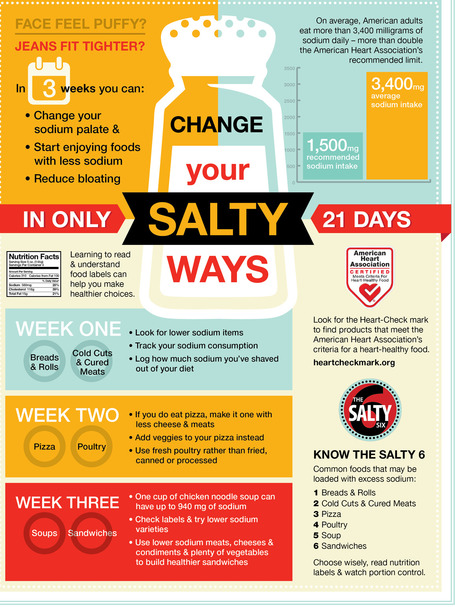Learn your sodium intake,read food labels. Do the math. How much are you getting on a daily basis?
medwireNews: Restricting salt intake reverses vascular endothelial dysfunction in people with moderately increased blood pressure (BP), shows a randomized study published in the Journal of the American College of Cardiology. To read more on this go to link at the bottom of this page.
How Sodium Causes Fluid Retention
The job of the kidneys is to filter the excess sodium into the urine so that the body can get rid of it. Many with heart disease and diabetes kidneys cannot handle all the extra work. The kidneys become less efficient at filtering the blood stream. This causes excess sodium to enter the bloodstream. Sodium attracts water to it and effect known as being osmotic. Water follows the sodium and is drawn into the bloodstream. Excessive salt keeps the circulatory volume higher than it should be, creating and increased pressure in the blood stream and pressing on the blood vessel walls. The stress of the pressure on the walls creates thickening and narrowing of the vessel, leaving less space for the fluid in the blood vessels and raising resistance. The body then requires higher pressure to move blood to the organs. The heart has to pump against this high pressure system.
I equate it to trying to blow up one of those kids balloons that is turned into animal shapes. They are really tough to blow air into, your cheeks get really sore – this is the resistance of air, similar to the resistance pressure of blood in the arteries. If you stretch the balloon (relax the arteries) then there is less resistance in blowing up the balloon (filling the artery with blood). Twenty percent of the blood pumped from the heart goes first to the kidneys. High blood pressure within the kidneys cause damage to the heart and to the vascular system in the kidneys. Salt makes you thirsty so limit salty foods, especially if on a fluid restriction.
I once had a patient who lost 45 lbs simply from adhering to low sodium diet. He had a very weak heart with only 10% ejection fraction meaning very limited pumping ability. So a weak heart and sodium in the diet made him retain fluid more than most. He began to measure and count sodium with every meal for a few months and was shocked by how much sodium he consumed even though he thought he ate pretty healthy. By reading labels, doing the math every day and making changes such as eating out less, ordering special, reviewing his medication he lost the fluid and added years to his life, not to mention the improved quality of life with less shortness of breath and fatigue by easing the workload of the heart.

According to the American Heart Association, eating more than the recommended 1500 milligrams a day puts you at direct risk of high blood pressure. Yet in America we consume an average of 3400 milligrams a day; more than twice what we should. While people with hypertension, heart and kidney disease are always advised by doctors to eat less salt, the AHA wants all of us to do this, whether or not our blood pressure is currently in the normal range.
http://newsroom.heart.org/news/change-your-salty-ways-in-only-241917
http://www.medwirenews.com/463/103163/Dietetics/Multiple_vascular_benefits_in_salt_restriction.html



Pingback: Sodium intake effects on heart vessels « Sattler's Online Diary
Reblogged this on Oyia Brown.
Reblogged this on Family Survival Protocol.
Awwwww, I love my sea salt…..I preserve in it, I pickle with it, etc, I even have a salt & pepper shaker in my glove box … 😀
lol….my husband used to keep salt in the glove box but it was to get leeches off his feet….I know it is a tough one to give up, but using lots and lots of herbs helps. Give it 30 – 60 days and then your body will adjust. Then you will be more aware of how your body responds when you get a high dose of it with fluid retention, thirst, and food being noticeably salty.
Everything in EXCESS Kills, MODERATION Prolongs ….I’m not that bad with salt, as I use most Raw produce, not processed 😉
Can’t stay away from my SAUERKRAUT tho 😀
Cheers, and to HEALTH.
SHALOM.
Right processed is where the majority of salt comes from. Rinse the sauerkraut in a collander for several minutes before cooking, will reduce about 40 percent…but will still be a days sodium content….moderation like you said, save the Sauerkraut for a couple times a year. Had a patient once that I gave the sodium lecture to, he looked up at me with tears in his eyes and said “I just put up 150 lbs of Sauerkraut for the winter”. My advice was well pass most of it on to friends or better yet enemies.
Got your point, WASH IT …Good advice..Oh Nooooo, not to give it to my friends, just,..Pass it on to my worst enemies yes, for sure. 😉
The only regret/s I will live with, is that I WILL GIVE AWAY MY HOME MADE BEST SAUERKRAUT 😀
Additional advice is when you know you are eating something high in sodium, to make sure you also eat fresh fruits or vegetables. By eating these you get higher concentrations of potassium and magnesium in the diet which help to balance out a bit of the effects of sodium.
Absolutely…… Most veggies ( With some exceptions ), are ALKALINE and very few fruits are also ACID, and so, one MUST KNOW WHAT GOES WITH WHICH……I believe I am doing still very well at 61, never took a pain killer yet, and still have NOT a Medical file, DATA or Record/s yet. 😀 …Ops, I lied, I took half an aspirin some 24 or more years ego ?…Wink